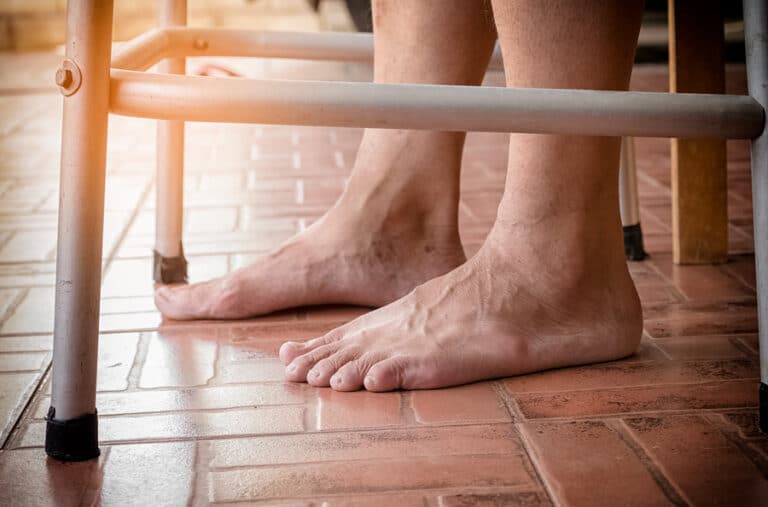Aging brings about numerous changes in the body, some of which can cause health problems. For instance, swollen ankles and legs are a common problem for older people. This condition, called peripheral edema, can be painful and even scary if not appropriately treated. Continue reading to learn about what causes swollen ankles and knees in seniors, how to avoid or treat them, and how companion care at home can help.
Understanding Peripheral Edema
Peripheral edema is caused by too much fluid building up in the lower legs, which makes them swell. Even though it can happen at any age, it is more likely to happen to older people due to the following reasons:
- Less blood flow: As seniors age, their blood flow can slow down, causing fluid to build up in their lower limbs.
- Weakened Muscles: If the muscles in the legs and feet get weaker, it can make it harder for the body to pump fluid back up to the heart.
- Gravity: The force of gravity can cause fluid to build up in the lower limbs, mainly if an older person stays still for a long time.
- Chronic Issues: Long-term health problems like heart disease, kidney disease, venous weakness, and even the side effects of some medications can all cause fluid retention.
Prevention Strategies
There are several things the companion care at home team and loved ones can do to help seniors prevent this issue. The most important of those is education. When seniors have consistent encouragement and feedback from their support team, they understand their situation better and can make steps toward better health. In addition to this, the following tips can also help.
- Stay active. Regular physical exercise helps blood flow and makes leg muscles stronger. Encourage older people to do low-impact activities like walks, swimming, and yoga.
- Focus on the legs being higher than the heart. When seniors sit or lie down, the companion care at home aide can help them prop their legs with pillows, which can help fluid get back to their heart and reduce swelling.
- Consider compression clothing. Stockings or socks with graduated compression can help avoid fluid buildup by ensuring the blood flows well.
Eat a well-balanced diet. This is another area in which the home care team can help. Seniors’ bodies will maintain the proper amount of fluid if they are provided meals that are lower in sodium and higher in potassium.
Treatment Options
If swelling does happen, seniors can take the following steps to deal with it:
- The R.I.C.E. Method: Rest, ice, compression, and raising the injured area can help ease pain and reduce swelling.
- Consistent Care For Ongoing Medical Issues: If the swelling is caused by an underlying health problem, fixing the problem can help control the edema.
- Talk to a Doctor: If the swelling doesn’t go away or is accompanied by pain, a change in color, or other strange symptoms, it’s essential to see a doctor to get the correct diagnosis and treatment plan.
Swollen ankles and legs can be painful and scary, but preventative steps can help minimize or alleviate the issue. The companion care at home team can encourage seniors to always prioritize health and well-being to better enjoy their golden years.
Sources:
https://betterhealthwhileaging.net/leg-swelling-in-aging/
https://dailycaring.com/3-simple-exercises-for-swollen-legs-and-ankles-in-seniors-video/
https://medlineplus.gov/ency/article/003104.htm
If you or an aging loved one are considering companion care at home in Watertown, MA, please contact the caring staff at PlatinumCare + today. Call (617) 237-0867.
PlatinumCare + was born out of the desire and passion to provide the very best home health care possible in Brookline, Dover, Newton, Needham, Watertown, Weston, Cambridge, Lincoln, Sudbury, Belmont, Boston MA, and surrounding areas.
Timothy’s journey spans decades of Managerial experience in IT Operations, Support, and Financial Management, where he honed his skills in creating seamless and technologically efficient systems. His expertise ensures that Platinum Care + operates with precision and reliability, providing a backbone of support that empowers our care services to run effortlessly. His strategic mindset allows us to integrate technology and care to enhance our clients’ experiences and the firm at large.
Brenda brings a wealth of experience in client relations, healthcare services, and sales management. Her innate ability to connect with people and understand their needs drives our client-focused approach. Brenda’s passion for nurturing relationships ensures that every interaction with Platinum Care + is warm, attentive, and deeply respectful of each client’s unique journey.
Both come from a storied and extensive background where community-based homecare was the norm. In their communities, caring for aging or ailing family members was a collective responsibility shared with compassion and unwavering support. This ethos of community care, where love, sacrifice, and empathy are paramount, forms the core of how Platinum Care + approaches homecare. Loving care, deep compassion and comfort.
By blending their unique skills and experiences, Timothy and Brenda have created a sanctuary of care beyond mere service delivery. Their shared mission is to cultivate an environment where clients feel empowered, understood, and cherished. At Platinum Care +, we are more than just caregivers; we are partners in your well-being journey, dedicated to making every moment meaningful and enriched with compassion.
Platinum Care + is where your health and happiness are our greatest priorities. Our commitment to unmatched excellence is reflected in every smile, every touch, and every service we provide.
- How Companion Care at Home May Help Seniors Feel Less Anxious - May 9, 2025
- Making Connections, One Visit at a Time - April 11, 2025
- Six Reasons Driving May Become Too Dangerous for Your Senior - March 27, 2025




